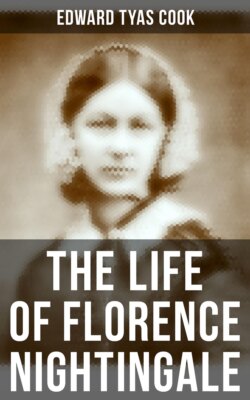Читать книгу The Life of Florence Nightingale - Edward Tyas Cook - Страница 31
На сайте Литреса книга снята с продажи.
IV
ОглавлениеAnother incident of Miss Nightingale's sojourn in Rome was destined, though she knew it not at the time, to have a far-reaching influence upon her career. Among the English visitors who spent the winter of 1847–48 in Rome were Mr. and Mrs. Sidney Herbert. Mr. Herbert had already been Secretary at War under Peel, a post to which he was afterwards to return under Aberdeen. The resignation of Peel's Cabinet in 1846 released Mr. Herbert from official work. Later in the year he married a lady with whom he had been long acquainted, Elizabeth à Court, daughter of General Charles Ashe à Court; and in the following year he and his wife set out for a long Continental tour. Mr. and Mrs. Bracebridge were friends of the Herberts, and thus Florence Nightingale made their acquaintance in Rome. In her retrospect she specially recalled the beginning there of her friendship with Sidney Herbert “under the dear Bracebridges' wing.” Compatriots who meet in this way in any foreign resort are apt to see a good deal of each other, and from this winter dates the beginning of a friendship which was to be a governing factor in the life of Florence Nightingale. Sidney Herbert, when they met in galleries or at soirées, or rode together in the Campagna, must have been struck by Miss Nightingale's marked abilities, and for Mrs. Herbert she formed an affectionate attachment. She noted “the great kindness, the desire of love, the magnanimous generosity” of her new friend. Mr. and Mrs. Herbert saw much of Archdeacon Manning (the future cardinal), who was also spending the winter in Rome, and Miss Nightingale was on friendly terms with him.42 This also was an acquaintance which had some influence on her future career. Sidney Herbert, aided by the ready sympathy of his wife, was devoting much thought, now liberated from official duties, to schemes of benevolence among the poor on his estates. “He felt strongly the disadvantage at which the poor were placed in being compelled after illness, and perhaps after undergoing painful operations, to return in the earliest stage of convalescence, without rest or change, to their accustomed labour.”43 He was full of a scheme for a Convalescent Home and Cottage Hospital (such as is now no rarity, but was then almost unknown), and it can be imagined with what zest Miss Nightingale shared his thoughts. One of the first things which she records in her diary after return from the Continent is “an expedition with Mrs. Sidney Herbert to set up her Convalescent Home at Charmouth”; but this was only a passing incident, and return to the habitual home life, after the distraction of foreign travel, left her no more contented than before.
On her return to London in the early summer of 1848 she sent her friends occasionally the talk of the town:—
(To Madame Mohl.) July 26 [1848]. In London there have been the usual amount of Charity Balls, Charity Concerts, Charity Bazaars, whereby people bamboozle their consciences and shut their eyes. Nevertheless there does not seem the slightest prospect of a revolution here. Why, would be hard to say, as England is surely the country where luxury has reached its height and poverty its depth. Perhaps it is our Poor Law, perhaps the strength of our Middle Class, perhaps a greater degree of sympathy between the rich and poor, which is the conservative principle. Lord Ashley had a Chartist deputation with him the other day, who stayed to tea and talked with him for five hours. “That a man should ride in a carriage and have twenty thousand a year is contrary to the laws of Nature,” said their leader, and slapped his leg. “I could show you, if you would go with me to-night,” said Lord Ashley, “people who would say to you, that a man should go in broadcloth and wear a shirt-pin (pointing to the Chartist's shirt) is contrary to the laws of Nature.” The Chartist was silent. “And it was the only thing I said,” says Lord Ashley, “after arguing with them for five hours which made the least impression.”
Her acquaintance with Lord Ashley (afterwards Lord Shaftesbury) brought her in touch with Ragged School work. But society grew more and more distasteful to Miss Nightingale. She explained the reasons in a letter to her “Aunt Hannah.” Why could she not smile and be gay, while yet biding her time and not forsaking her ultimate ideals? It was, she said, because she “hated God to hear her laugh, as if she had not repented of her sin.” There is something obviously morbid in such words, and they might be multiplied indefinitely, if there were good reason for doing so, from her letters, diaries, and note-books. The sins of which she most often convicted herself were “hypocrisy” and “vanity.” She prayed to be delivered from “the desire of producing an effect.” That was the “vanity”; and it was “hypocrisy,” because she was playing a part, responding to friends' conception of her, though all the while her heart was really set on other things, and her true life was being lived elsewhere. The morbidness was a symptom of a mind at war with its surroundings. Then again the kind “Aunt” reminded her, in the spirit of George Herbert, that anything and everything may be done “to the glory of God.” But Miss Nightingale at this time was deep in the study of political economy; and “can it be to the glory of God,” she asked, “when there is so much misery among the poor, which we might be curing instead of living in luxury?”
